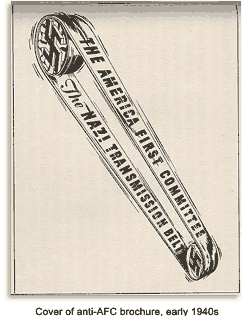The America First Committee (AFC) was organized in September 1940 to oppose America`s potential intervention in World War II. Hitler`s invasion of Poland had precipitated war in September 1939. A year later, the only major military force resisting the Nazis was Britain. The smaller nations had been quickly overrun, France had capitulated, and the Soviet Union was using its nonagression pact with Germany to pursue its own interests in Finland and elsewhere. At the time, a majority of Americans felt that while the world would be a better place if Britain prevailed over Germany, they were not inclined to declare war and repeat the earlier experience of American soldiers fighting on European soil.
This reluctance had inspired Congress to pass neutrality acts in the late 1930`s which restricted the American government`s ability to support either party in the conflict, which in practice meant the Allies since the Axis powers were widely regarded with distaste. Roosevelt, who had been corresponding with Churchill for years before Churchill was even part of the Tory government, clearly identified American interests with the hope for British victory. Using tactics like the "bases for destroyers" deal, he attempted to maximize his support for the British while skirting if not actually violating the principle of neutrality.
The AFC opposed him at every step. Its membership, which grew to around 800,000 by early 1941, was national in character while especially strong in the Midwest. Its best known leader was Charles A. Lindbergh, who was accompanied by an amazing array that included critics of Roosevelt from the right (Col. McCormick of the Chicago Tribune) and the left (the socialist Norman Thomas), along with stolid isolationists (senators Burton Wheeler of Kansas and William A. Borah of Idaho) and the anti-semitic Father Edward Coughlin.
 When Lend-Lease was proposed by Roosevelt in the winter of 1941, the AFC was strongly opposed. Lindbergh gave speeches across the country, emphasizing that support for Britain was sentimental and misguided. His main points were that geographically, it was impossible to imagine Britain defeating Germany from its island air bases or for an invasion of the European continent with the million men that would be required for victory. He argued that while fighting a war in Europe would be a disaster for the United States, geography greatly favored a defensive position that would allow it to hold the entire Western Hemisphere against any aggressor.
The AFC and its supporters lost the debate on Lend-Lease, which Congress passed, giving Roosevelt broad powers to provide material support to the Allies. When the Nazis invaded the Soviet Union in June 1941, Communist support for the AFC evaporated. By the fall, with war coming ever closer, the AFC`s influence was dwindling.
The end came quickly. Four days after the Japanesee attack on Pearl Harbor on December 7, 1941, the AFC dissolved itself. In its final statement, the committee declared that while its policies might have prevented war, that war was now a reality and it had become the duty of American to work for the united goal of victory.
The AFC`s stance demonstrated the limits and perils of "realism" in foreign policy. Lindbergh`s analysis of the military situation in 1940 was largely correct, but had his ideas prevailed, Britain might not have survived long enough to benefit from Hitler`s rash and ultimately disastrous decision to invade Russia.
When Lend-Lease was proposed by Roosevelt in the winter of 1941, the AFC was strongly opposed. Lindbergh gave speeches across the country, emphasizing that support for Britain was sentimental and misguided. His main points were that geographically, it was impossible to imagine Britain defeating Germany from its island air bases or for an invasion of the European continent with the million men that would be required for victory. He argued that while fighting a war in Europe would be a disaster for the United States, geography greatly favored a defensive position that would allow it to hold the entire Western Hemisphere against any aggressor.
The AFC and its supporters lost the debate on Lend-Lease, which Congress passed, giving Roosevelt broad powers to provide material support to the Allies. When the Nazis invaded the Soviet Union in June 1941, Communist support for the AFC evaporated. By the fall, with war coming ever closer, the AFC`s influence was dwindling.
The end came quickly. Four days after the Japanesee attack on Pearl Harbor on December 7, 1941, the AFC dissolved itself. In its final statement, the committee declared that while its policies might have prevented war, that war was now a reality and it had become the duty of American to work for the united goal of victory.
The AFC`s stance demonstrated the limits and perils of "realism" in foreign policy. Lindbergh`s analysis of the military situation in 1940 was largely correct, but had his ideas prevailed, Britain might not have survived long enough to benefit from Hitler`s rash and ultimately disastrous decision to invade Russia.